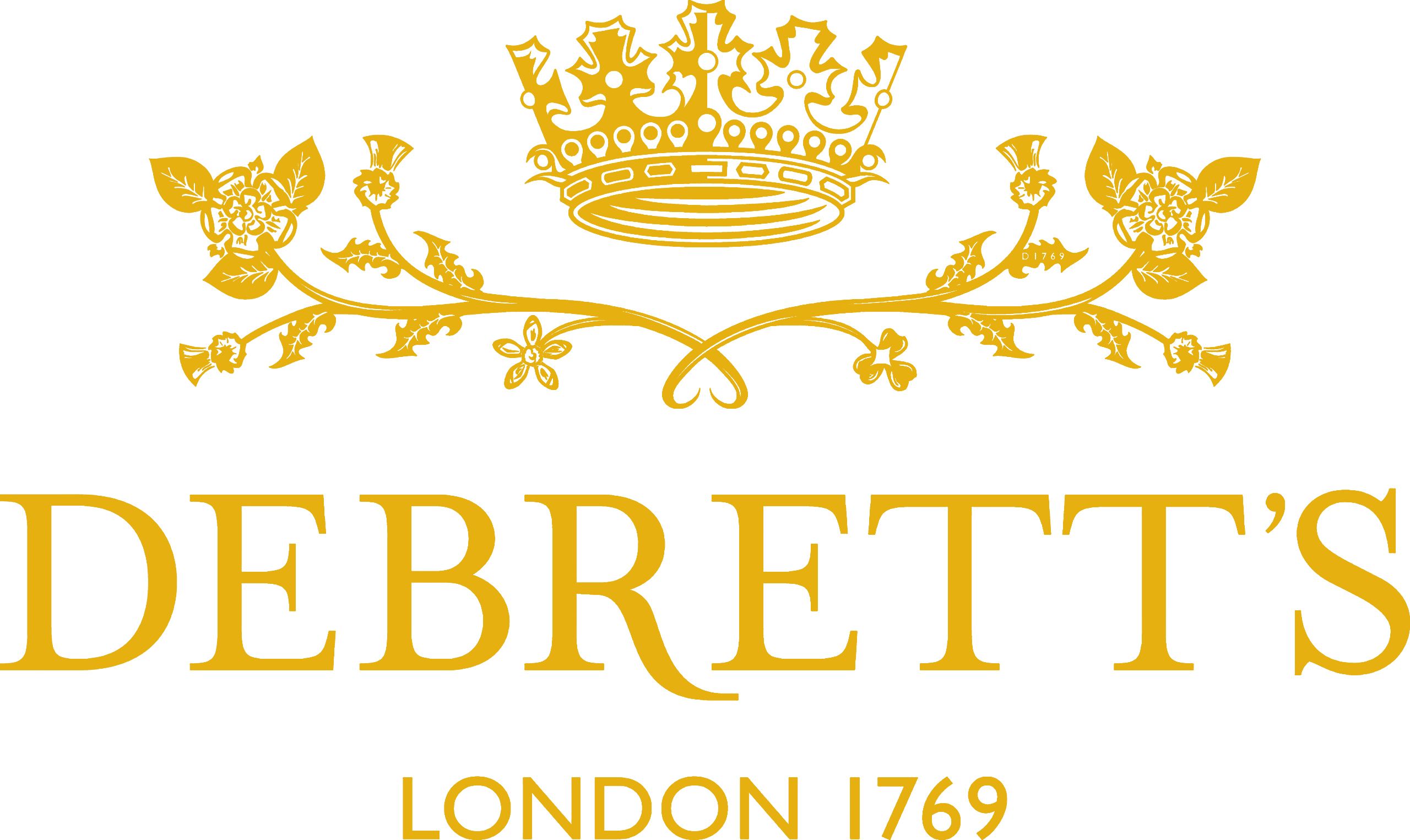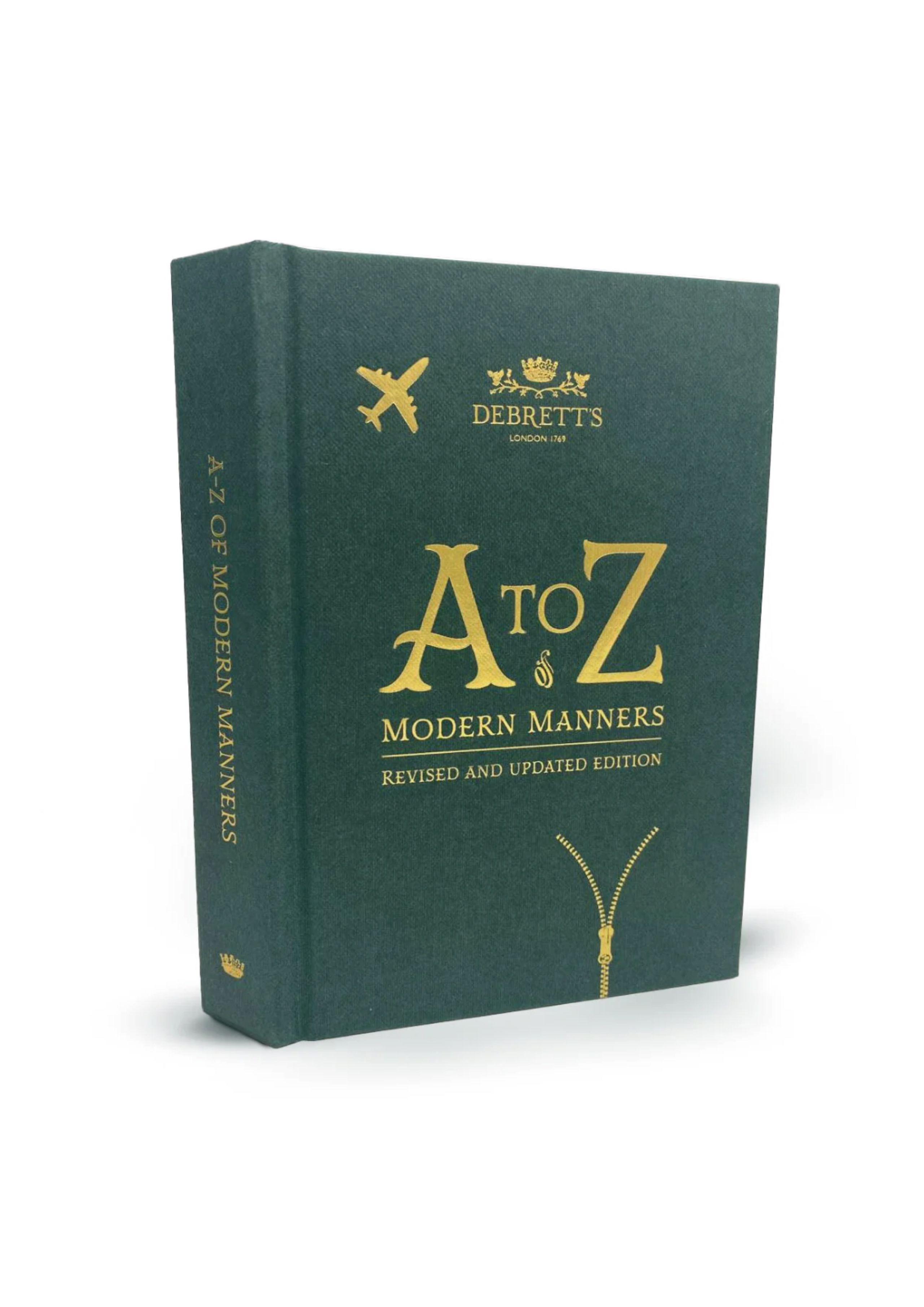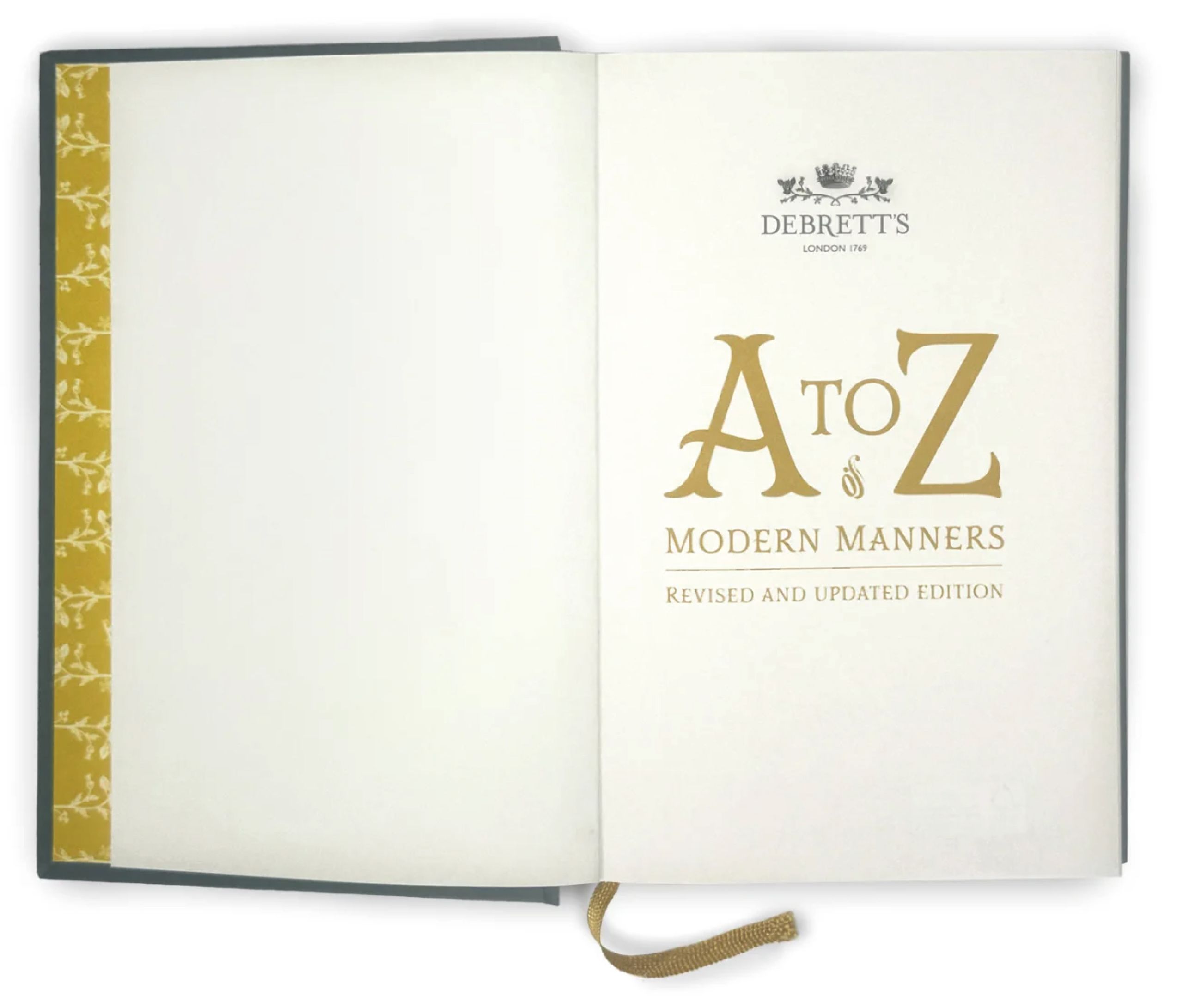The A-Z
of Modern Manners
From Liz Wyse, the Etiquette Editor of Debrett’s, the ultimate authority on Britain’s titled aristocracy and matters relating to protocol, precedence, etiquette and behaviour since 1769

The publication of our latest edition of the A to Z of Modern Manners has led us to muse about how the world has changed since the book was first published in 2008. A new digital age had dawned, and we were all trying to come to grips with a range of new phenomena, from mobile phones and online dating to civil partnerships and plastic surgery.
Over the intervening years, the entries have changed with the times. We have become less transfixed by conventional social minefields and more fixated on the challenges of modern life. As the old certainties about codes of conduct and etiquette are eroded and challenged by technological changes, new freedoms and an increasingly fluid sense of social mobility, we have evolved a new guide to the challenging world of contemporary conduct.
Our new entries address behaviour that has emerged from a world of instant communication and social media or been driven by new technology and social change. We look at a host of social challenges from bullying, boasting, ghosting and gloating to manspreading, multitasking, oversharing and virtue signalling. We also examine new phenomena such as digital nomads, electric cars, group messages, hybrid working and voice notes, as well as offering advice on how to navigate timeless social minefields, from dress codes and writing letters to sending out invitations and devising a seating plan.
We hope that the latest edition of the A-Z of Modern Manners will provide some guidance to help us find our way through a volatile social landscape. We have learned that manners are no longer fixed and immutable, but are dynamic and adaptable, constantly being tested and updated to cope with fundamental changes.
When Debrett’s first started publishing in the eighteenth century, knowledge of how to behave was a precious social asset, a passport to the most elevated drawing rooms in the land and a guarantee of respectable social status
Thoroughly Modern Manners
When Debrett’s first started publishing in the 18th century, etiquette codes were complex and prescriptive. Knowledge of how to behave was a precious social asset, a passport to the most elevated drawing rooms in the land and a guarantee of respectable social status. Etiquette guides were widely distributed to young ladies and gentlemen as they stood on the brink of adulthood, and they were advised to take careful note of the advice they contained.
To deviate from these codified norms of behaviour guaranteed standing out for all the wrong reasons: an inability to recognise complex conventions of respect to elders and betters, a display of ineptitude at the dining table, a risqué anecdote or an over-bold demeanour could all condemn a social aspirant to calumny. Once the pillars of society had identified these transgressions, perpetrators became social outcasts, who were not invited to the best homes and, most damagingly of all, were not allowed to marry into the best families.
Our society has changed in so many fundamental ways. While the remnants of these codes of behaviour still exist, they are for the most part seen as dispensable, only to be respected and adhered to on the most formal of occasions. Ignorance of such arcane knowledge is no longer a form of social suicide: formal manners can be acquired if necessary and, if they are lacking, nobody will be roundly condemned for their deficiency. When once a code of good behaviour was wielded as a weapon designed to protect the upper classes, wrapping them in a bubble of respect and ritual, good manners are now seen as a much more pragmatic asset, which is open to all comers.
Debrett’s first published the A to Z of Modern Manners in 2008, largely as a response to the ways in which society was obviously changing. A new digital age had dawned, and we were all trying to come to grips with a range of new challenges, from mobile phones and online dating to civil partnerships and plastic surgery. At the same time, we wrestled with all too familiar etiquette minefields, from chivalry and christenings to oysters and port etiquette.
Over the intervening years, the entries have changed with the times. We have become less transfixed by conventional dilemmas (challenging foods, confusing cutlery, rituals such as christenings, traditional wording of invitations), though we still do our best to address pressing questions of ‘good form’ (how to tie a bow tie, what you should wear to a funeral). In addition, we find ourselves increasingly looking at the way in which changing times impact on behaviour, constantly throwing up new etiquette challenges.
In 2008 we would not have considered addressing topics such as ghosting, humblebragging or virtue signalling. But all these behaviours have emerged from a world of instant communication and social media, where lives are lived online and we have learnt to curate, and safeguard, our own digital personas.
Our methods of communication have changed immeasurably: not only do we all have mobile phones, but the way we use these handy devices has changed fundamentally over the last decade. We tend to eschew phone calls in favour of texts, we enjoy group chats, and increasingly ignore voicemails. We are riveted by our phones, fiddle with them compulsively, even when we’re walking down the street, jeopardising other people’s safety, and causing much resentment when we seem to prefer phones over people.

A new digital age had dawned, and we were all trying to come to grips with a range of new challenges, from mobile phones and online dating to civil partnerships and plastic surgery
We find ourselves confronted with a host of persistent social challenges, from bullying, boasting and gloating to manspreading, multitasking and oversharing. Post-Covid, we are wrestling with hybrid working and video calls and many of us have become digital nomads. Theatre and cinema audiences are becoming ever rowdier, tending to treat these public spaces much like their own homes. Even electric vehicles are bringing their own etiquette dilemmas.

Despite all these changes, there are still recognisable traits that define us, from stiff upper lips and reticence to discretion and self-deprecation. These are all familiar British characteristics, which have been eroded over the last decades, and to some extent repudiated, but they remain surprisingly resilient and have evolved in interesting ways.
We hope that the latest edition of the A-Z of Modern Manners will reflect all these transformations and provide some guidance to help us navigate our way through a volatile social landscape. We have learned that manners are no longer fixed and immutable, but are dynamic and adaptable, constantly being tested and updated to cope with fundamental changes.
Underpinning it all is a recognition that, no matter how much the trappings of social life change, the fundamentals remain the same. Good manners are about being aware of your environment, and observant about the people around you. Well-mannered people like to put others’ comfort ahead of their own, to set other people at their ease, making the world feel a more civilised, friendly and calm place. Everyday politeness is a vital ingredient in the cocktail of manners that makes the world a better place; somewhere basic survival is finessed into a more subtle pleasure.
Click here to purchase your copy of the Revised Edition of the A-Z of Modern Manners by Liz Wyse.
Discount code for Diplomat is DIPLOMAT5
It's for £5 off the A-Z, with a minimum spend of £20, and runs until 31 August 2024.
Debrett’s Peerage & Baronetage database contains biographical information and coats of arms for over 3,000 hereditary peers, life peers and baronets. Its Guide to the Peerage explains the history and system of titles in the UK.
Debrett’s Etiquette is an unrivalled guide to protocol and modern manners, offering information about addressing royalty, people with titles and members of the professions, as well as advice on correspondence, rites of passage, business etiquette and international etiquette.
Both, or either, of these options are available through a Debrett's subscription.
